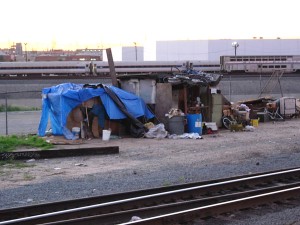USC should reach out to the homeless
Anyone who’s walked The Row or visited the University Village will tell you that the area has a problem with homelessness.
There seems to be endless debate about whether this is really a university issue or if it would be better handled by the city of Los Angeles. But the fact remains that it needs to be dealt with.

Homelessness is a major problem in the city of Los Angeles and especially in the area around USC. | Creative Commons
It’s unrealistic to assert that our campus should be wiped clean of panderers, but an alternative can certainly be achieved by those with the authority to effect positive change.
It would help USC’s reputation to be proactive about solving the homeless issue around campus, and would help students feel more secure.
An employment commission could improve our community relations. Our nation’s unemployment rate is currently 10 percent, so this method could help everyone in Los Angeles, not just the homeless.
Though Los Angeles runs on a tight budget, it is vital to aid those who are at least looking to contribute to an ailing economy. The last thing our legislators and employers can do is to leave those looking to better their lives in the dust.
And that’s where USC comes in. Our university is the largest private employer in the region. Surely, our campus has a tremendous impact on the success, or struggles, of our local economy.
There could be a system put in place by the university that helps people find jobs that are low-requisite, entry-level positions that aren’t too demanding, but provide a steady income.
With leading professional studies in business, public policy and community relations, USC has the firepower necessary to put theory to work by fueling job creation and higher standards of living for those who desperately need our help.
Already, USC has proven successful in improving the quality of life for those in surrounding neighborhoods.
But we cannot stop there, not when homelessness still looms large on the streets of Figueroa and Jefferson.
We must take initiative so that the homeless can return the favor.
With the right kind of promotion, the homeless might take the initiative to seek those jobs and use the public programs to their benefit. And if we put friendly, likable people in charge of recruitment, they could certainly earn the trust of homeless people and convince them to better their lives.
I know it’s idealistic. I’m very well aware that there are deeply rooted issues that lead to homelessness.
We can, and must, take charge and do something about a social issue that USC clearly has the resources to confront.
Clinton VanSciver is an undeclared sophomore.

Typical of USC. I put in a negative comment about the homeless around here and that they dont want help. They only want your money for their next crack fix. Of course I put those comments in and they wont let it post.
oh wait now it shows up with the “your comment is awaiting moderation”
What & where is THE ROW & University Villiage? Remember that us readers know nothing except what you tell us.
And what makes you think that people who are obviously too lazy and/or inept to find a job at a McDonald’s just down the road are going suddenly feel motivated to work for one located within the walls of USC? The school’s only responsibility to to students, and the parents who pay their tuition, by focusing on cutting-edge resources and providing the best possible opportunities for the next generation of Trojans
“Our university is the largest private employer in the region. Surely, our campus has a tremendous impact on the success, or struggles, of our local economy.”
Is it fair to call the university the largest private employer in the region, when it’s only the largest in the city of L.A.?
This isn’t idealistic in the least. We should be forcing USC to live up to its “Good Neighbor” proclamations all the time. However, these types of actions shouldn’t be taken unilaterally, but with constant input and influence from local community organizations even though USC has a notorious history of flatly ignoring their concerns.